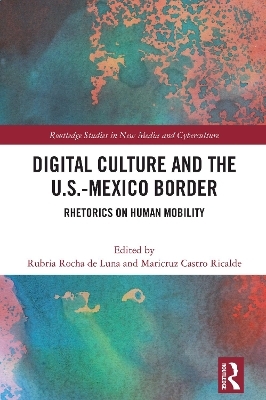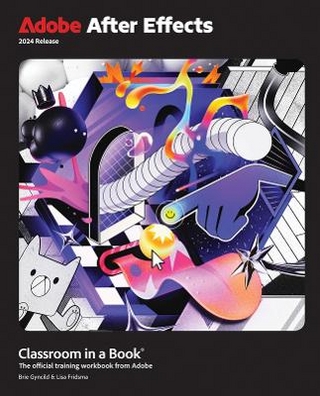
Digital Culture and the U.S.-Mexico Border
Routledge (Verlag)
978-1-032-85654-4 (ISBN)
- Lieferbar (Termin unbekannt)
- Versandkostenfrei innerhalb Deutschlands
- Auch auf Rechnung
- Verfügbarkeit in der Filiale vor Ort prüfen
- Artikel merken
In the context of a world where digital media has helped to shape geopolitical borders and impacted human mobility in positive and negative ways, the book explores new modes of expression in which identification, memory, representation, persuasion, and meaning-making are created, experienced, and/or circulated through digital technologies. An interdisciplinary team of scholars looks at how quick communications bring closer transnational families and how online resources can be helpful for migrants, but also at how digital media can serve to control and reinforce borders via digital technology used to create a system of political control that reinforces stereotypes. The book deconstructs digital artifacts such as the digital press, social media, digital archives, web platforms, technological and artistic creations, visual arts, video games, and artificial intelligence to help us understand the anti-immigrant and dehumanizing discourse of control, as well as the ways migrants create vernacular narratives as digital activism to break the stereotypes that afflict them.
This timely and insightful volume will interest scholars and students of digital media, communication studies, journalism, migration, and politics.
Rubria Rocha de Luna is Postdoctoral Researcher in the Digital Humanities Research Group, School of Humanities and Education at Tecnologico de Monterrey, México. Maricruz Castro Ricalde is Digital Humanities Co-leader in the School of Humanities and Education at Tecnologico de Monterrey, México.
Introduction
Section 1: Memory, Identity, and Representation of Human Mobility through Social Media and Digital Archives
1. Digital Archives and Women’s Identity: Transborder Rhetorical Practices in Late 19th and Early 20th Century Periodicals
2. The Migrant Woman in the Language of the Mexican Digital Press
3. Embracing the ‘American Dream’ Social Media Imaginary vs. the Daily American Nightmare for Immigrant Women
4. Crossing the Darien with TikTok: Self-representation and Digital Solidarities in Forced Migrants from Venezuela in Transit to the U.S.
5. Music, Migration, and Mexicanness in the Digital World
Section 2: Art and Imaginaries: Border Experiences Mediated by Technology
6. The Rhetoric of Empathy: Digital Storytelling Co-creators Seeking to Humanize Migration and Deportation
7. Towards a Hyper-Aesthetics of Migration: Transnational Identities, Hyperborders, and Hypermediacy in the Visual Narratives of Evan Apodaca and Alex Rivera
8. Reimagining the U.S.-Mexico Borderlands through Contemporary Ecocritical Art
9. Rearticulating Ex-votos within Digital Spaces
10. Visual Imaginaries from Artificial Intelligence on the United States-Mexico Border.
Section 3: Digital Constraints: Representations and Modes of Border Political Control
11. Sleep Dealer (Alex Rivera, 2008): Reconfiguration of Limits/Borders in a Cyborg/Cybernetic Culture
12. “Mi entrevista en Juárez”: The Digital Rhetorics of YouTube Immigration Videos
13. Higher Education for Dreamers Returning to Mexico: Vagueness of Official Communications from a User Experience Perspective
14. Engaging Action: Procedural Rhetoric and Agentive Arguments in Border Crossing Videogames
15. Migration Policy in Mexico and Situated Knowledge: The Denial of Justice as a Form of Discrimination
| Erscheinungsdatum | 02.11.2024 |
|---|---|
| Reihe/Serie | Routledge Studies in New Media and Cyberculture |
| Zusatzinfo | 11 Tables, black and white; 27 Halftones, black and white; 27 Illustrations, black and white |
| Verlagsort | London |
| Sprache | englisch |
| Maße | 156 x 234 mm |
| Themenwelt | Kunst / Musik / Theater |
| Informatik ► Grafik / Design ► Film- / Video-Bearbeitung | |
| Sozialwissenschaften ► Kommunikation / Medien ► Kommunikationswissenschaft | |
| Sozialwissenschaften ► Kommunikation / Medien ► Medienwissenschaft | |
| Sozialwissenschaften ► Soziologie | |
| ISBN-10 | 1-032-85654-8 / 1032856548 |
| ISBN-13 | 978-1-032-85654-4 / 9781032856544 |
| Zustand | Neuware |
| Informationen gemäß Produktsicherheitsverordnung (GPSR) | |
| Haben Sie eine Frage zum Produkt? |
aus dem Bereich


